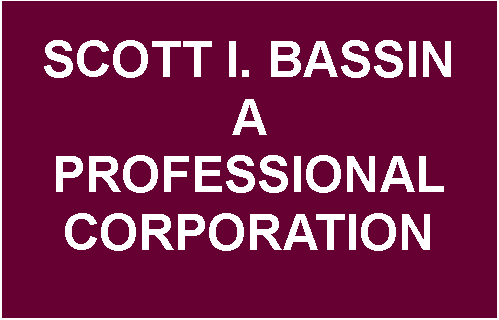Blog: types of business entities
San Francisco Business Attorney
Types of Business Entities
When starting a new business, choosing the correct business entity is important. There are six common types of business entities in the United States and each one has different legal and tax implications. If you are a business owner that is unsure of which business entity suits your needs, you can learn more by discussing your business plan with experienced San Francisco business formation lawyers at Bassin Law.
Generally speaking, a business entity is an organization that is created to conduct business. A business can be created by either an individual or a group of individuals. The entity type that a company chooses will determine how the business is structured and how taxes are assessed to that business.
Choosing a business entity should be one of the first tasks handled by the founders of the business. This choice will have an impact on taxes and various legal aspects involved with operating the business including: the total taxes the business owes to the IRS and local/state tax authorities, the process of applying for a small business loan, and can affect fundraising from investors.
Whether a business forms as an LLC, Corp, or partnership changes who is liabile if the business is sued.
What Are the 6 Business Entity Types?
Sole Proprietorships
Sole proprietorships are the simplest type of business entity, as they only involve one owner (or a married couple). The individual or couple is the business’ sole owner and operator. Those who open new businesses as the only owner are legally considered sole proprietors automatically. They do not need to register the sole proprietorship with their state but may be required to apply for local permits and business licenses, depending on the industry. Freelancers and consultants are typically classified as sole proprietors, but other businesses with only one owner and operator also use this designation.
The main benefits of a sole proprietorship involve the simplicity of it, such as no registration requirements and comparatively simple tax requirements from the Internal Revenue Service (IRS). However, sole proprietors are exposed to more risk in terms of liability, as someone who wins a lawsuit against the business may recover the business owner’s personal assets, such as bank accounts and real estate properties. There is also no true legal separation between the owner and the business, which can make it difficult to receive a business loan and raise money from investors and lenders. You can learn more about sole proprietorships by contacting the San Francisco business lawyers at our Firm.
General Partnerships
A general partnership is similar to a sole proprietorship in many ways, but always has two or more owners. Like sole proprietorships, the owners of general partnerships do not need to register with their state, as this is the default structure for businesses with multiple owners. In general partnerships, all partners are actively involved with the management of the business and share in both profits and losses.
General partnerships are legally very similar to sole proprietorships. Both are easy to start, and the owners are not required to follow corporate formalities such as meetings, voting, and shares.
A Big advantage of a General partnership is that the partners may deduct most business losses when they file their personal tax returns. General partnerships do not offer partners limited liability or protection from lawsuit. All owners are personally liable for business debts and other liabilities. Some states also hold each partner personally liable when another partner acts negligently. Additionally, general partnerships offer no advantage over sole proprietorships when attempting to secure a business loan.
Limited Partnerships
Unlike General Partnership and Sole Proprietorships, limited partnerships must be file paperwork with the secretary of state.
Limited partnerships involve two types of partners: “General Partners” who are the owners that oversee the day to day operations of the business. The general partners also assume liability from suits against the partnership.
Limited Partners are partners who are investors but are not involved with the day to day business of the partnership. Limited partners do not have any say in business operations, have fewer liabilities, and typically pay fewer taxes.
The advantage of a limited partnership is that the owners often are more easily able to raise money. Investors can act as limited partners without the risk of being held personally liable. The general partners can acquire the funding they need to operate and build the business while Limited partners can also leave the agreement at any time without putting the limited partnership at risk.
Note: general partnerships are personally liable for debts and liabilities of the business and Limited partnerships are also more expensive to form compared to general partnerships.
C Corporations
C corporations are business entities that are legally separate from the owners of the company, who are known as Shareholders. The shareholders, delegate control of the day to day operations to officers who directly manage the company, and a board of directors who oversee the officers and are often majority shareholders. This type of business entity involves complex regulations and tax laws. The requirements and fees for incorporating vary between states.
The owners of a C corporation are not personally liable for the debts and liabilities of the businesses. C corporations qualify for more tax deductions than all other types of business entities and an owner pay lower self-employment taxes. Owners may not deduct business losses when filing their personal tax returns with the Internal Revenue Service and local tax authorities.
S Corporations
In an S corporation, all corporate income, deductions, losses, and credits are passed to the shareholders Under the federal tax code. Shareholders report the income and losses on their personal tax returns and are taxed based at their individual tax rates. This is call pass through taxation and This system prevents double taxation on corporate income. However, shareholders are not personally liable for debts and liabilities. S corporations are also expensive to form compared to sole proprietorships and partnerships, but the financial benefits are usually worth the extra cost.
Limited Liability Company (LLC)
Limited liability companies offer many of the benefits of the other types of business entities, with fewer drawbacks. They enjoy the same limited liability protections as corporations, but usually involve less paperwork and fewer corporate requirements. The owners of LLCs also have the option to be taxed as a corporation or a pass-through business entity. Many small business owners (including freelancers) choose LLCs for their simplicity and legal protections.
Our San Francisco Business Formation Lawyers are here to help
If you are unsure which one of the common types of business entities suits your business or have any other business formation questions, Our experienced San Francisco business lawyers can evaluate your business and determine which option best suits your needs and preferences.
At
Scott I. Bassin, A Professional Corporation, in San Francisco, California,
a business litigation lawyer works with you to solve your business related and litigation issues.
Contact the office today.



